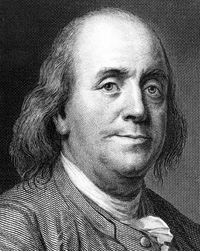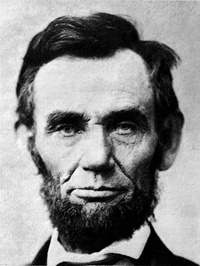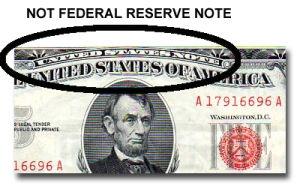If the money is BORROWED into existence as it is
done in our current "debt based" monetary system, the money is created out of
thin air by the banks using the fractional reserve lending
system. This money is then a representation of debt and has a debt and interest
burden associated with it.
The way money is brought into circulation is at the
very heart of our problems. It turns out that in our "debt based" monetary
system, our entire money supply (except for coins) is created
when a loan is taken out. Once the loan is repaid, the money is removed from
circulation. This system unfortunately
has a fatal flaw that guarantees its ultimate collapse.
Let's assume that we are on an island with a totally
closed monetary system and you were to borrow $100 at 10% interest. You can pay
back the $100 principle because $100 was put into circulation as a result of
your loan. However, where will the $10 in interest payments come from if there
is no other money in circulation? The fact of the matter is that the loan must
default because there is not enough money in circulation to pay principal and
interest. Since the $100 in circulation is the result of the loan being taken
out. This $100 is placed as a liability on the bank's books. Once you have paid
off the loan, this liability is removed from the bank's ledger. That is how the money is extinguished
once you have repaid the principal on the loan. The only way to pay back the
interest on the loan is to borrow more money into circulation. Only the
principle is extinguished, the interest is not extinguished because the
interest was not a liability on the bank's ledger. The interest amount ends up
in the pockets of the bankers. If someone takes
out additional loans
to cover the interest charges, it will only delay the day of reckoning. Ultimately
you will have an even higher interest burden that can never be repaid. Doesn't this sound familiar to the economic
situation we currently find ourselves in?
Of course our monetary system has millions of
people, taking out loans, making payments and doing other transactions all of
the time. However, the fact remains that you can only repay a loan with
interest if you or someone else takes out a loan to place additional money into
circulation. The problem is that now someone else will have a loan to repay and
will also need additional money in circulation to pay for their interest
charges. So the debt burden for the money to pay the interest payment on your
loan has been shifted to someone else,
and over time the interest burden continues to grow. It becomes quickly obvious
that as a nation we must constantly be in debt in order to service the interest
charges on our money supply. As time passes, this debt overhang with its
associated compounding interest charges becomes a larger and larger burden on
the society, eventually reaching a level that is no longer sustainable as it is
becoming today.
The other fatal flaw in this system is that in order
for the money supply to keep up with the growth in the economy, we must also continue
to grow the debt in order to grow the money supply. Some of those clueless
politicians represented by the first doctor we visited at the beginning of this
article think we should pay off the debt. What they do not realize is that if
the debt was ever totally paid down, there would be no money in circulation. Our
current "debt based" monetary system is the DISEASE. Until we change
our monetary system from "debt based" to "wealth based", we can never pay off
the debt, because if we did, there would be no money in circulation. The
patient would die!
Think about this example of the insanity of the
current system. If a government wants to build a bridge, instead of printing
and then SPENDING the money into the economy with no interest bearing debt
associated with it, the government instead goes to the bankers and BORROWS the
money into existence. By BORROWING the money into existence, the government
incurs interest charges which means that over the term of loan the government
will pay more money for this bridge in finance charges than it pays for the
materials and for the labor for the project. This financing cost of "debt
based" money is then passed on to everyone.
In a "wealth based" system, the government would SPEND
the money into existence, rather than BORROW it into existence. The costs of
all infrastructure projects could be cut by more than half. This fact should
resonate to those of you with a home mortgage, once your mortgage is paid off,
the interest charges have easily exceeded the original cost of your home. The
same thing is happening to all of our infrastructure projects. The financial
class is profiting immensely from our
current "debt based" system.
 So, is a "wealth based" monetary system some utopian
vision of what has never been and can never be? The answer is no. In our
colonial past we had colonial
scrip where the government SPENT the money into existence. Our colonies were prospering at that time. David Hayes writes
about Benjamin Franklin during a visit to England:
So, is a "wealth based" monetary system some utopian
vision of what has never been and can never be? The answer is no. In our
colonial past we had colonial
scrip where the government SPENT the money into existence. Our colonies were prospering at that time. David Hayes writes
about Benjamin Franklin during a visit to England:
The English officials
asked how it was the Colonies managed to collect enough taxes to build poor houses,
and how they were able to handle the great burden of caring for the poor.
Franklin's reply was most revealing: "We have no poor houses in the
Colonies, and if we had, we would have no one to put in them, as in the
Colonies there is not a single unemployed man, no poor and no vagabonds."
Think long and hard about this. In the American colonies before the American
Revolution, there was "not a single unemployed man, no poor and no
vagabonds". -- no one on Welfare, no one on Social Security, no homeless,
no income tax, no alphabet agencies, No IRS, BATF, FBI, DEA, CIA, HEW, OSHA,
SBA, and on and on and on to provide for the "general welfare" of our
villages, towns, cities and states. How did Benjamin Franklin explain this to
the British officials of his day?
How would he explain it to today's lawyers, judges, politicians and other
government officials? "It is because, in the Colonies, we issue our own
paper money. We call it Colonial Script, and we issue only enough to move all
goods freely from the producers to the Consumers; and as we create our money,
we control the purchasing power of money, and have no interest to pay."
The colonies did not have this problem because they
used "wealth based" money that had need SPENT into circulation. This caught the
attention of the English bankers. They had laws passed that prohibited the
colonies from using their "wealth based" currency and mandated that "debt
based" currency should be used. Within a year after passage of these laws, the
colonies found themselves with mass unemployment and beggars as Franklin had
found in England. This suffering brought on by a "debt based" currency was the trigger
for the Revolutionary War. Unfortunately, even after the Revolutionary War, the
monetary system remained "debt based" and except for brief periods of time we
never returned to a "wealth based" currency.
 Later in our
history, Abraham Lincoln was faced with the financing costs of the civil war. He
went to the bankers and found to his dismay that they were going to charge him
24% to 36% interest which would have left the country hopelessly indebted to
the bankers. Instead, he issued Treasury Notes that came to be known as Greenbacks
because of their green colored ink on the back. This money was independent and
debt free and was spend into circulation with no debt or interest burden.
Lincoln understood the power of the bankers which led him to write:
Later in our
history, Abraham Lincoln was faced with the financing costs of the civil war. He
went to the bankers and found to his dismay that they were going to charge him
24% to 36% interest which would have left the country hopelessly indebted to
the bankers. Instead, he issued Treasury Notes that came to be known as Greenbacks
because of their green colored ink on the back. This money was independent and
debt free and was spend into circulation with no debt or interest burden.
Lincoln understood the power of the bankers which led him to write:
"The money powers prey upon the nation in times of peace and
conspire against it in times of adversity. It is more despotic than a monarch,
more insolent than autocracy, and more selfish than a bureaucracy. It
denounces, as public enemies, all who question its methods or throw light upon
its crimes. I have two great enemies, the Southern Army in front of me and the
bankers in the rear. Of the two, the one at the rear is my greatest foe."
Abraham Lincoln
In fact, Lincoln did exactly what the founding
fathers had envisioned for the Republic when they specified that "only Congress
shall have the right to coin money". We all know what happened to Lincoln after
the war.
 John Kennedy
also understood the damage that the current "debt based" money system was
having on the nation and he signed Executive Order
11110 which allowed the Treasury to issue "United States Notes" without
having to go through the Federal Reserve system. Some of you may remember these
"United States Notes" as they had the red seal on them, not the usual green
seal of the Federal Reserve Notes. This money was also spent into the economy
and was free of any debt and interest burdens.
John Kennedy
also understood the damage that the current "debt based" money system was
having on the nation and he signed Executive Order
11110 which allowed the Treasury to issue "United States Notes" without
having to go through the Federal Reserve system. Some of you may remember these
"United States Notes" as they had the red seal on them, not the usual green
seal of the Federal Reserve Notes. This money was also spent into the economy
and was free of any debt and interest burdens.
We
all know what happened to
Kennedy a few months after signing that executive order.
(Note: You can view every article as one long page if you sign up as an Advocate Member, or higher).





